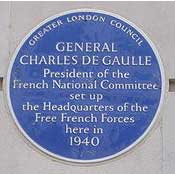|
The Mystery, the Enigma, that was General Charles Andre Joseph Marie de Gaulle
Even at this distance in time from the end of WW2, I am at a loss to really understand and explain this very complex Frenchman. He had been born in Lille in the French industrial north in 1890, and brought up in metropolitan Paris. Joining the army, he was a prisoner of war in WW1, de Gaulle was an early advocate of mechanized warfare extolling the use of tanks, and wrote a text book about their employment in battle. At the start of WW2 he was but a humble Colonel, who then escaped to Britain in 1940, and saw himself as the natural leader of the Free French, and the rallying point to build up a force that in time would return to his home country and cast off the Nazi yoke. In my view, he always seemed to promise more than he ever delivered, no doubt if he had embraced the concept of cooperation with his Allies in WW2, he would have achieved much more, but he never grasped the slightest meaning of that word, to his detriment. He was a real pain in the neck for Winston Churchill, who despaired of his difficult demands and unilateral actions. Roosevelt thought him " essentially an egotist. " His one great love was France, to the extent perhaps I may call his country, his Mistress. Other than his Mother and his wife, women appear to have had no influence whatsoever on the General, one host said " de Gaulle was the dullest dinner companion we ever had." From his great height he always appeared to be looking down his nose with some distain all that encompassed his gaze. The Debacle at Dakar No determined attempt was made to land and wrest Dakar from the Vichy troops in occupation there, and I felt that de Gaulle did not have his heart in this operation, when the British Battleship Resolution was torpedoed, it was time for the force to withdraw, an abject failure. Return to France During that period he took France out of NATO, and made sure that Britain was vetoed from joining the Common Market. Come 1968, a general strike and the student riots particularly in Paris rocked the Government, who had lost control on the streets of the French capital. Charles de Gaulle as President was absent from France at the time of these disturbances. At that time I happened to be in Paris on business, but the current chaos precluded any business being conducted. At first hand, I watched in shock, as students defied the police, overturned their police cars, and then set them on fire. I also managed to visit the Sorbonne where students had occupied the campus and were demanding many changes to the curriculum and more teaching staff and a say in the way the University was run. History was in the making in Paris, bringing the winds of change, and I was fortunate to be a witness there at that time. de Gaulle on his return called an election to be again endorsed by the electorate, he lost a referendum on proposed reforms, and so gave up the Presidency in 1969 after some 11 years at the helm. After a heart attack he died on the 9th. of November 1970. Was he a great statesman and President? Always controversial and somewhat of a loner, he was austere, haughty, but brought stability to France during his 11 years in power. I again reiterate, that if he had learned the art of cooperation with his Allies in WW2 he might well have achieved a great deal more. I am a biased observer, much disenchanted by his performance at Dakar, and being placed in " Harm's Way " as a result, so I should not respond to my own question. But, whatever history makes of this complex figure that strutted the French, European and World stages for over a decade, his work and actions were always inspired by his beloved FRANCE. |

